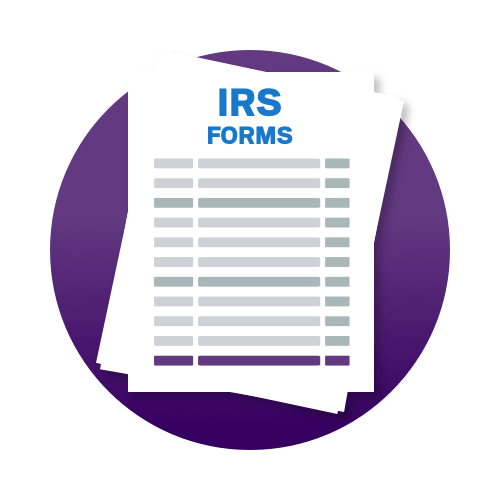- Find an office
-
File Your Taxes
 Find a Location
Find a Location -
Resolve Tax Issues
 Resolve Tax Issues
Resolve Tax IssuesResolve Tax Issues
-
Tax Resources
 See all Tax Help
See all Tax HelpTax Tools
Tax Tips & Resources
- Where's My Refund
- Refund Advance
- Hiring Local Jobs!
- Tax Services
- Promotions & Coupons
- Careers
- Search
- Contact Us
- Feedback
-
 Log in | Sign up
Log in | Sign up

JH Accounts
|
|
Oh no! We may not fully support the browser or device software you are using ! To experience our site in the best way possible, please update your browser or device software, or move over to another browser. |
IRS Forms
What is Form 1040-ES?

Many taxpayers ask us every year about IRS Form 1040-ES. What is it, and what does it have to do with quarterly tax payments? Here, we’ll break down the details, so you can learn whether you need to file Form 1040-ES.
What is Form 1040-ES?
You use IRS Form 1040-ES to calculate and pay your quarterly estimated tax payments. Whether you need to make quarterly tax payments depends on the type of income you earn.
In many cases, if you earned income through self-employment or gig work, or you have investment income, you’ll need to pay estimated taxes during the year, or you risk paying penalties when you go to file. You can complete Form 1040-ES manually or using tax software, and file the form quarterly.
Do I need to file Form 1040-ES?
You will need to file Form 1040-ES if you are required to make estimated tax payments. Estimated tax payments are needed for people who receive taxable income that doesn’t already have federal income taxes withheld. This includes interest, dividends, other types of investment income and self-employment income.
There are types of income such as unemployment and retirement benefits that allow voluntary withholding. In these cases, it’s your choice to either have your taxes withheld from your payment or make estimated tax payments instead.
In most cases, you are required to make estimated tax payments if you expect to owe at least $1,000 when you file your taxes, or you are self-employed or have a side gig during the year. There are several types of income that could oblige you to make estimated tax payments, including the following:
- Self-employment or gig income, such as a ride-share driver and grocery or food deliverer
- Investment income, such as interest and capital gains from stock sales
- Rental income
- Certain legal settlements
- Gambling winnings
- Prizes
- Selling a business
Self-employment income is the most common type of income requiring quarterly tax payments. If you’re self-employed, every quarter, you’re responsible for paying:
- Your income taxes
- Your self-employment taxes, which are the same as yours and your employer’s equal share of the Medicare and Social Security taxes paid to IRS each payday
- Other taxes such as alternative minimum taxes
You use Form 1040-ES to pay your taxes quarterly during the year. Then, when it’s time to file your yearly taxes, you include the estimated taxes and any withholdings on your tax return.While you may regularly have investment and self-employment income, single large transactions, such as winning a prize, could also require a large one-time estimated tax payment.
Form 1040 vs Form 1040-ES
You use Form 1040 to file your taxes. It determines if you are getting a refund or if you owe.
You use Form 1040-ES to determine your quarterly estimated tax payment, and to make your payment if you mail it instead of paying online.
However, you need to report the money you paid using the 1040-ES on your 1040, in the same area as withholdings and refundable credits. This is important, so that you don’t end up paying taxes on your income twice.
When do I have to file Form 1040-ES?
If you pay your estimated taxes online, you will only use the Form 1040-ES worksheet to determine your estimated payments. You will not need to include the actual form along with your payment. Paying online is safer and more secure for you. However, if you mail your payment to IRS, you must include a 1040-ES for that payment.
You should pay estimated taxes every quarter by the deadline to avoid penalties.
What is a form 1040 ES payment voucher?
If you are mailing in your payment, you’ll need to send it with a payment voucher to the correct IRS address, based on the state where you live. When you send your payment along with Form 1040-ES do not include your estimated tax worksheet. Instead, keep the worksheet with your tax records for the year.
Do I need to file Form 1040-ES if I’m making my tax payments online?
You do not need to file Form 1040-ES if you make estimated tax payments online. You have two options.
IRS Online Account
You have the most flexibility in how you pay by establishing an IRS Online Account. Creating your account takes about 15 minutes to two hours, because it requires verification. But once you set it up, you can pay using just about any payment method, such as your bank account, credit card, and the Electronic Federal Tax Payment System (EFTPS). In addition, your online account allows you to securely access many areas of your account, including your past returns and transcripts, IRS notices, your refund, and more.
IRS Direct Pay
If you aren’t ready to set up an IRS Online Account, but you need to pay estimated taxes on your personal income, you can use IRS Direct Pay. It offers a faster way to pay timely and accurate estimated tax payments instead of mailing, because it doesn’t require you to create an account. But it gives you more limited access to your IRS information than an IRS Online Account.
Additionally, when you’re paying online using either method, you can pay by the month or transaction. For example, you may want to pay taxes on investment and rental income by the month, because it’s ongoing, while you would pay a single, large sum for your estimated taxes on a less frequent transaction, such as winning the lottery.
If you make multiple payments before the quarterly deadline, the IRS considers them as a single sum for the quarter in question. For example, let’s say you paid $1,000 per month in estimated taxes based on your self-employment income in January and February, and you paid $5,000 in March for a sizable taxable legal settlement you received. In this case, the IRS would consider your first-quarter prepaid taxes to be one sum of $7,000, because you paid all of the amounts before April 15.
Regardless of whether you pay online or file Form 1040-ES by mail, keep in mind that if you earn income that is not subject to withholding, you are required to make estimated tax payments, or you risk paying penalties.
What if I don’t pay estimated taxes?
If you don’t pay estimated taxes equal to at least 90% of what you should pay, the IRS will add an under-withholding penalty to your tax bill.
Do I have to pay the full amount of my estimated taxes each quarter?
It’s a good idea to pay the full amount of your estimated taxes each quarter, or you risk having to pay a penalty—on top of the taxes you owe. Have questions? A Jackson Hewitt Tax Pro can help you figure out if you need to pay, how much, and when.
Because trust, guarantees, convenience & money all matter

-
TRUSTED GUARANTEES.
Be 100% certain about your money & your taxes, year after year.
-
NATIONAL PRESENCE. LOCAL HEART.
We’re in your neighborhood & inside your favorite Walmart store.
-
40+ YEARS. 65+ MILLION RETURNS.
The kind of trusted expertise that comes with a lifetime of experience.





